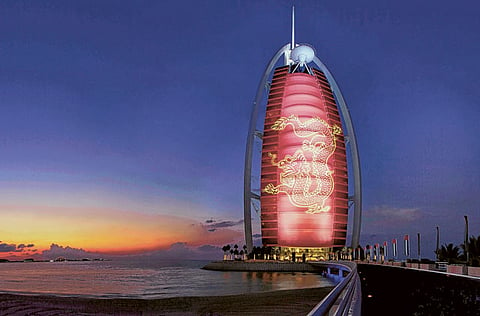Enter the dragon!
The Year of the Dragon promises large extravaganzas among Chinese residents in the city

DUBAI: Come January 23 and nearly 200,000 Chinese residents in the UAE will welcome the Year of the Dragon in style!
Sure enough, hotels and restaurants are gearing up to lay out lavish Chinese cuisine ranging from delectable dumplings to Yu Seng, the traditional fish salad.
Atlantis The Palm's Saffron restaurant will offer authentic Chinese meals like Yu Seng and Nian Gao, while diners will be treated to the traditional lion dance. At Dh220 per adult and Dh110 per child, the deal promises an amazing Asian dining experience.
As part of the celebrations Burj Al Arab's iconic exterior ‘sail' will be illuminated by a massive red dragon which can be seen from miles away and the hotel's Junsui restaurant will offer gastronomic delights under the gaze of an awe-inspiring ice sculpture of Chinese dragon Yu Seng.
While the Chinese New Year celebrations are on the way, Chef Tran at Hoi An at Shangri-La will also prepare a special menu to celebrate the Vietnamese New Year which falls on the same day. Traditional decorations, including Vietnamese lanterns, will adorn the restaurant. Guests will be treated to instrumental music as they gorge on a six-course set-menu priced at Dh400 per person, including beverages (Dh288 excluding beverages).
According to Lucy Haiou Chuang, Founder and Head of Dubai Chinese Learning Centre, the New Year (referred to as the Spring Festival — Chun Jie) is a 15-day celebration at the start of the Chinese lunar calendar. "The Chinese calendar is luni-solar and the New Year is the most important festivity in the nation," she said. It signifies new energies that bring good luck and prosperity.
"One of the important traditions on New Year's Eve [January 22] is cleaning the house. It's a time to discard bad energies. By sweeping off the dust, one is sweeping off ill luck to make way for good luck to enter the house," Lucy said.
Typically windows and doors will be decorated with red paper-cuts and couplets on popular themes — good fortune or happiness, wealth and longevity. Children will make red paper lanterns to decorate homes.
An important tradition on New Year's Eve is the Chu Xi or the annual reunion dinner. "It includes duck, chicken and sweet delicacies. Some families usher in the New Year with firecrackers," Lucy said.
The first day of the New Year is celebrated with the extended family, including grandparents. Men and women wear traditional dress — Qi Pao for ladies and Tang Zhuang for men — while visiting the grandparents. "Children and unmarried youngsters look forward to this visit as elders give them cash in red envelopes," said Lucy.
The last day of the 15-day celebration is called Yuan Xiao Jie or the sweet dumpling festival. It is marked by the lantern festival and lion and dragon dances.
"The lion dance or Wushi is performed by two dancers in a lion costume. The dragon dance or Wulong is performed by a team of dancers carrying a dragon on poles. One dragon comprises up to 50 dancers," she said.
"The Dragon exudes power and the Chinese believe that those born in the Year of the Dragon are rarely unsuccessful in life. So this year, do anticipate prosperity and success," she added.

